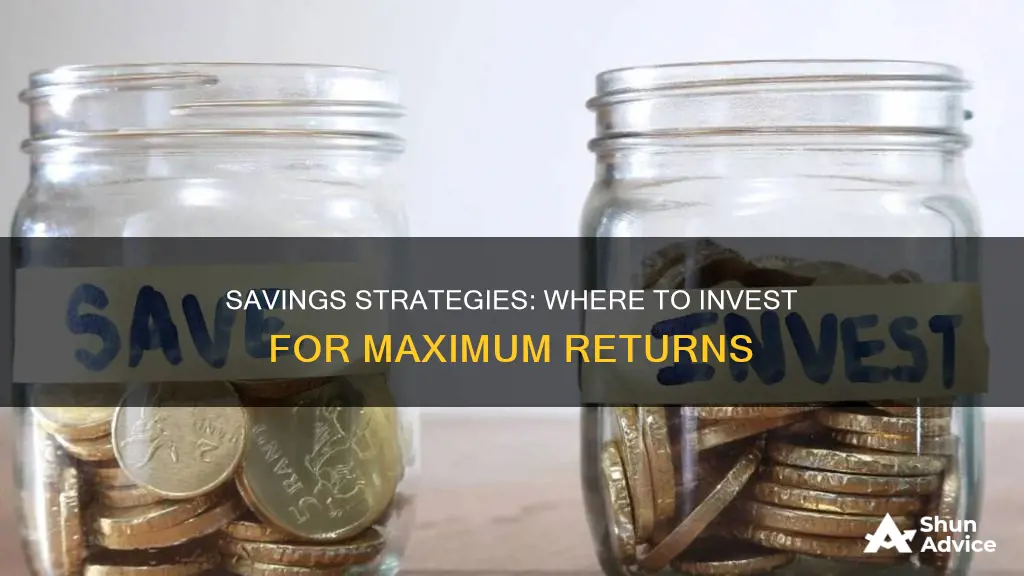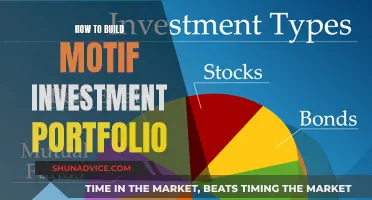
There are many options for where to invest your savings, and the best choice depends on your financial goals and risk tolerance. Savings accounts, certificates of deposit (CDs), money market funds, treasury bills, and bonds are all options for investors. If you're looking for low-risk investments, savings accounts, CDs, and money market accounts are good choices. For higher returns, you can consider investing in stocks, mutual funds, or exchange-traded funds (ETFs). It's important to diversify your investments and balance potential gains with the risk involved.
| Characteristics | Values |
|---|---|
| Accessibility | High |
| Risk | Low |
| Returns | Low |
| Investment Options | High-yield savings accounts, certificates of deposit, money market funds, money market deposit accounts, treasury bills and notes, dividend stock funds, value stock funds, small-cap stock funds, rental housing, S&P 500 index funds, Nasdaq-100 index funds, bonds, stocks, etc. |
What You'll Learn

High-yield savings accounts
While high-yield savings accounts offer higher interest rates than traditional savings accounts, there are some potential downsides to consider. These accounts may have higher minimum balance requirements, and there may be restrictions on the number of withdrawals or transfers allowed per month. Additionally, rates for high-yield savings accounts are variable and could fluctuate.
When choosing a high-yield savings account, it is important to look for accounts with competitive annual percentage yields (APYs) and low or no monthly service fees. Some popular banks that offer high-yield savings accounts include SoFi, Capital One, Goldman Sachs' Marcus, and Barclays.
Investing Life Savings: Strategies for Long-Term Financial Growth
You may want to see also

Long-term certificates of deposit
CDs are a good choice for retirees who don't need immediate income and are able to lock up their money for a little bit. They are also a good option for risk-averse investors who need money at a specific time and can tie up their cash in exchange for a higher yield than they'd find on a savings account.
The best CD rates range from 4.30% to 5.00% APY. Here are some examples of banks offering competitive rates for long-term CDs:
- Quontic Bank: 3 months - 5 years, 3.00% - 4.95% APY, $500 minimum deposit
- America First Credit Union: 3 months - 5 years, 3.85% - 4.70% APY, $500 minimum deposit
- Barclays Bank: 6 months - 5 years, 3.00% - 4.65% APY, no minimum deposit
- Capital One: 6 months - 5 years, 3.50% - 4.50% APY, no minimum deposit
- Popular Direct: 3 months - 5 years, 3.40% - 4.50% APY, $10,000 minimum deposit
- Vio Bank: 6 months - 5 years, 2.75% - 4.30% APY, $500 minimum deposit
CDs tend to have higher rates than regular savings accounts. These rates are higher in exchange for no access to that money during a CD's term. The combination of CDs’ low risk and high rates compared to other bank accounts can make them an attractive investment.
Investing My Daughter's Savings: Strategies for Long-Term Growth
You may want to see also

Money market funds
- Prime Money Fund: Invests in floating-rate debt and commercial paper of non-Treasury assets.
- Government Money Fund: Invests a minimum of 99.5% of its assets in cash, government securities, and repurchase agreements.
- Tax-Exempt Money Fund (Municipal Money Market Fund): Offers earnings that are exempt from federal income tax and, in some cases, state income tax.
- Standard Money Market Fund: Designed with a minimum investment horizon of three months, offering the potential for higher yields by holding less liquidity and slightly lower credit quality.
Tracking Savings and Investments: Quicken's Smart Money Management
You may want to see also

Treasury bills and notes
Treasury bills (or T-bills) are short-term investments with maturities of one year or less, while treasury notes have maturities ranging from two to ten years. Treasury bills are sold at a discount, meaning that they are sold for less than their face value. When the bill matures, it will be worth its full face value. The difference between the purchase price and the face value is the interest. For example, a $1,000 bill might be purchased for $990; at maturity, it will be worth the full $1,000. Treasury notes are issued with maturities of two, three, five, seven, and ten years and earn a fixed interest rate every six months. In addition to the interest, the T-notes can be cashed in for the face value at maturity if purchased at a discount. Both Treasury bills and notes are available at a minimum purchase of $100.
Treasury bills are usually sold in denominations of $100 and can reach a maximum denomination of $10 million. The US Department of the Treasury sells T-bills through auctions using a competitive and non-competitive bidding process. T-bill rates depend on interest rate expectations.
However, it is important to note that treasury bills and notes have low returns compared to other debt instruments. They also do not offer periodic interest payments, which can inhibit cash flow for investors who require steady income. Additionally, there is a risk that treasury bills and notes will become less attractive in a rising-rate environment as their fixed interest rate may be lower than the market rate.
Saving and Investment: Understanding the Fundamentals
You may want to see also

Dividend stock funds
Dividend stocks are considered safer than growth stocks or non-dividend stocks, but it's important to choose your portfolio carefully. Look for companies with a solid history of increasing dividends rather than those with the highest current yield, as this could be a sign of impending trouble. Even well-regarded companies can fall victim to a crisis, so it's important to do your research.
One of the benefits of dividend stock funds is that they provide instant diversification, reducing your reliance on any single company. This means that even if one stock in the fund cuts or suspends its dividend, you can still rely on income from the others.
Reinvesting dividends can also greatly enhance your return on investment. Dividends typically increase the return of a stock or fund by a few percentage points. For example, the historical total annual return of the S&P 500, including dividends, has been about two percentage points higher than the index's annual change in value.
While dividend stock funds are considered a relatively safe investment, they do carry some risks. Dividends are never guaranteed and companies can reduce or eliminate them at any time. During the Covid-19 pandemic, several prominent companies cut their dividends, including Wells Fargo, Dick's Sporting Goods, and Carnival.
Additionally, investors who focus too much on dividends may ignore some sectors and classes of companies that are needed for good diversification. Young, fast-growing tech companies, for example, don't generally pay dividends.
From Saving to Investing: Strategies for Your Financial Journey
You may want to see also







